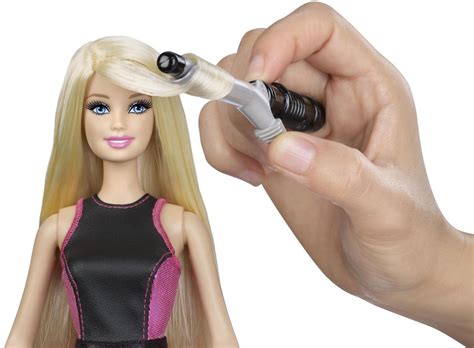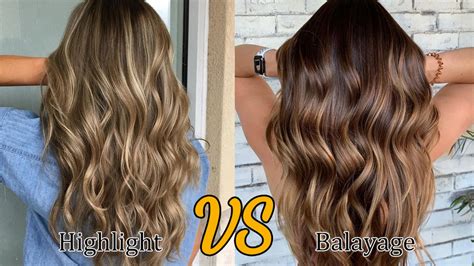The world of hair coloring offers a vast array of techniques, with balayage and highlights emerging as popular choices. Both methods aim to add dimension and depth to your hair, but they employ distinct approaches and yield unique results. Understanding the difference between balayage and highlights is crucial for making an informed decision that aligns with your desired hair goals.

Balayage: A Gradual, Sun-Kissed Effect
Balayage (pronounced “ba-lay-aj”) is a French hair coloring technique that involves hand-painting color onto selected sections of hair. It creates a natural-looking, sun-kissed effect, with subtle transitions from darker roots to lighter ends.
How Balayage Works:
- The stylist uses a paddle brush to section and lift individual strands of hair.
- Color is applied directly to the strands, without the use of foils or a cap.
- The stylist controls the placement and intensity of the color, creating a customized look tailored to your hair texture and skin tone.
Benefits of Balayage:
- Natural-looking: Balayage mimics the gradual lightening effect of the sun, resulting in a believable and flattering result.
- Low maintenance: The subtle transitions between colors mean less noticeable root regrowth, making it easier to maintain your color between salon visits.
- Versatile: Balayage can enhance a variety of hair colors and textures, from dark brown to blonde. It is particularly suitable for creating ombré and dip-dye effects.
Highlights: Precision Coloring for Dramatic Impact
Highlights involve applying color to small, evenly spaced sections of hair. They create a more defined, brighter contrast than balayage, adding depth and dimension to the hair.
How Highlights Work:
- The stylist uses foils or a cap to separate sections of hair.
- Color is applied to the isolated sections, allowing it to penetrate the hair shaft.
- The foils or cap are left in place for a predetermined amount of time to allow the color to process.
Benefits of Highlights:
- Dramatic results: Highlights provide a noticeable color contrast, creating a bolder and more impactful look.
- Targeted lightening: The targeted application allows for precise control over the color placement, enabling you to achieve specific effects, such as framing the face or accentuating the ends.
- Versatility: Highlights can be customized to create a wide range of effects, from subtle dimension to chunky, contrasting streaks.
Comparing Balayage and Highlights: A Summary
| Feature | Balayage | Highlights |
|---|---|---|
| Application method: | Hand-painted | Foils or cap |
| Effect: | Gradual, sun-kissed | Defined, contrasting |
| Transition: | Subtle and natural | Noticeable and sharp |
| Maintenance: | Minimal | Requires more frequent touch-ups |
| Best suited for: | Natural-looking color, ombré effects | Defined contrast, dramatic impact |
Choosing Between Balayage and Highlights
The choice between balayage and highlights ultimately depends on your individual preferences and hair goals. Consider the following factors:
- Desired effect: If you prefer a natural, sun-kissed look, balayage is the better choice. If you want more dramatic, contrasting results, highlights are more suitable.
- Hair type: Balayage is ideal for all hair types, while highlights are best suited for thicker, coarser hair.
- Maintenance routine: Balayage requires minimal maintenance, while highlights need more frequent touch-ups to maintain the contrast.
Step-by-Step Guide: Creating Balayage
Materials:
- Hair dye
- Paddle brush
- Mixing bowl and brush
- Gloves
Instructions:
- Section your hair into four quadrants.
- Select a strand of hair from the top quadrant and lift it at a 90-degree angle.
- Apply the color to the mid-lengths and ends of the strand, leaving the roots untouched.
- Repeat steps 2 and 3 for all strands in the top quadrant.
- Process the color according to the manufacturer’s instructions.
- Repeat steps 2-5 for the remaining quadrants.
- Rinse the hair thoroughly and condition as usual.
Step-by-Step Guide: Creating Highlights
Materials:
- Hair dye
- Foils or cap
- Mixing bowl and brush
- Gloves
Instructions:
- Section your hair into small, even squares.
- Place a foil or cap over the square to isolate the section.
- Apply the color to the isolated section, brushing it onto the hair from roots to ends.
- Fold the foil or cap over to cover the colored section.
- Repeat steps 2-4 for all sections of hair.
- Process the color according to the manufacturer’s instructions.
- Rinse the hair thoroughly and condition as usual.
Tips and Tricks for Perfect Balayage and Highlights
- Consult a professional: For the best results, visit a professional hair stylist who specializes in balayage or highlights.
- Consider your skin tone: Choose hair colors that complement your skin tone and eye color.
- Start with subtle changes: If you’re unsure about which technique to choose, start with subtle color changes and gradually increase the intensity.
- Use quality products: Invest in high-quality hair dye and follow the manufacturer’s instructions carefully.
- Protect your hair: Use a heat protectant spray when styling your hair to prevent damage.
Conclusion
Balayage and highlights are versatile hair coloring techniques that can enhance your appearance and boost your confidence. Understanding the difference between these two methods is essential for making an informed decision that aligns with your desired results. By carefully considering your hair type, goals, and preferences, you can achieve a beautiful and flattering transformation that will leave you feeling vibrant and refreshed.
